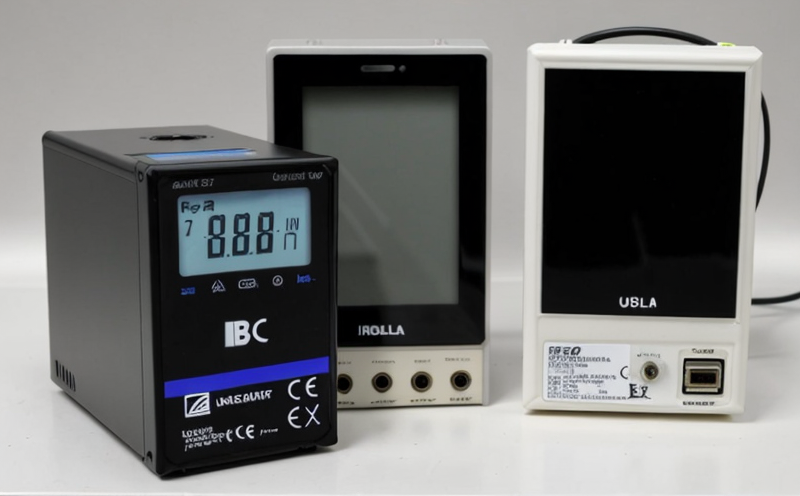ANSI C18.2M Consumer Electronics Secondary Portable Battery Testing
The ANSI/IEEE C18.2M:2017 Standard for Consumer Electronic Secondary (Rechargeable) Portable Batteries is a critical specification that ensures the safety, performance, and reliability of rechargeable batteries used in consumer electronics such as smartphones, laptops, digital cameras, and other portable devices. This standard covers a broad range of battery types including lithium-ion, lithium-polymer, nickel-metal-hydride (NiMH), and others.
The ANSI C18.2M standard is designed to ensure that batteries are safe for use in consumer electronics by specifying test methods and requirements for various aspects of battery performance, such as capacity retention, charge/discharge cycling, over-temperature testing, and more. Compliance with this standard helps manufacturers meet regulatory requirements and enhances product safety.
Our laboratory offers comprehensive testing services to ensure that batteries comply with the ANSI C18.2M standard. Our team of experts uses state-of-the-art equipment and follows rigorous procedures to conduct tests according to the latest version of the standard. We provide detailed reports that can be used for internal quality assurance, compliance documentation, or regulatory submissions.
The testing process typically involves several steps:
- Capacity Testing: Measuring the battery's ability to hold and deliver electrical charge over multiple charge/discharge cycles.
- Over-temperature Testing: Evaluating how well the battery performs under extreme temperature conditions, which is crucial for ensuring safety in various environments.
- Cycling Tests: Simulating real-world usage scenarios to assess long-term performance and durability of the battery.
- Environmental Stress Tests (EST): Subjecting batteries to different environmental stresses such as humidity, altitude, and vibration to ensure they remain functional under adverse conditions.
- Electrical Safety Testing: Ensuring that the battery operates safely within its intended environment without causing hazards like fire or explosion.
In addition to these tests, our laboratory can also perform custom testing tailored to specific client needs. This might include additional environmental stressors not covered in the standard, specific performance metrics relevant to certain product lines, or other specialized requirements.
Our commitment to accuracy and reliability is reflected in our adherence to international standards such as ANSI/IEEE C18.2M:2017. By adhering strictly to these guidelines, we ensure that every test conducted meets the highest industry expectations.
To summarize, ANSI/IEEE C18.2M:2017 is a vital standard for ensuring the safety and performance of rechargeable batteries in consumer electronics. Our laboratory provides robust testing services to help manufacturers comply with this standard while enhancing product quality and safety.
Applied Standards
The ANSI/IEEE C18.2M:2017 standard is widely recognized for its comprehensive approach to battery testing in consumer electronics. It covers a wide range of test procedures aimed at ensuring the reliability, safety, and performance of secondary portable batteries.
- Capacity Testing: Measures how much charge a battery can hold after multiple cycles of charging and discharging.
- Over-temperature Testing: Assesses battery behavior during prolonged exposure to high temperatures.
- Cycling Tests: Simulates the repeated charge/discharge process that batteries undergo in daily use.
- Environmental Stress Tests (EST): Exposes batteries to various environmental conditions like humidity, altitude, and vibration.
- Electrical Safety Testing: Ensures that batteries function safely within their intended applications without posing risks such as fire or explosion.
The standard also includes requirements for battery packaging, labeling, and documentation. These provisions are essential for ensuring that consumers can use the products safely and responsibly.
Our laboratory strictly adheres to ANSI/IEEE C18.2M:2017 when performing tests on batteries. This ensures consistency with industry best practices and helps manufacturers achieve compliance more easily.
Environmental and Sustainability Contributions
Battery testing in accordance with the ANSI/IEEE C18.2M standard not only enhances product safety but also plays a crucial role in promoting environmental sustainability. By ensuring that batteries are durable, efficient, and safe, we contribute to reducing waste and preventing environmental pollution.
- Reduced Waste: Durable batteries last longer, meaning fewer replacements and less electronic waste sent to landfills.
- Energy Efficiency: Testing for optimal performance helps reduce energy consumption during use, contributing positively to overall efficiency.
- Material Sourcing: Ensuring battery safety encourages responsible sourcing practices that minimize environmental impact.
- Regulatory Compliance: Meeting standards like ANSI/IEEE C18.2M ensures compliance with international regulations designed to protect the environment.
Beyond these direct benefits, our laboratory’s adherence to stringent testing protocols helps promote a culture of responsibility within the electronics industry. This contributes to broader sustainability goals by fostering innovation in more efficient and environmentally friendly technologies.
By participating in this process, we are actively contributing to the global effort towards creating a sustainable future where technology serves both human needs and environmental well-being.
Use Cases and Application Examples
The ANSI/IEEE C18.2M:2017 standard is particularly relevant for manufacturers of consumer electronics such as smartphones, laptops, digital cameras, and other portable devices that rely heavily on rechargeable batteries. Here are some specific use cases where compliance with this standard is crucial:
- Smartphone Manufacturers: Ensuring battery longevity and safety in a device used by millions every day.
- Laptop Makers: Providing reliable power for extended periods during intensive computing tasks.
- Digital Camera Companies: Guaranteeing that cameras can operate continuously without interruption, especially in challenging conditions like extreme temperatures or humidity.
- Wearable Device Producers: Ensuring small but powerful batteries last longer and perform reliably over time.
In each of these applications, the ANSI C18.2M standard provides a framework for developing safe and efficient batteries that meet consumer expectations while also contributing to environmental sustainability goals. Compliance with this standard ensures that products are not only functional but also responsible choices in an increasingly environmentally conscious world.





